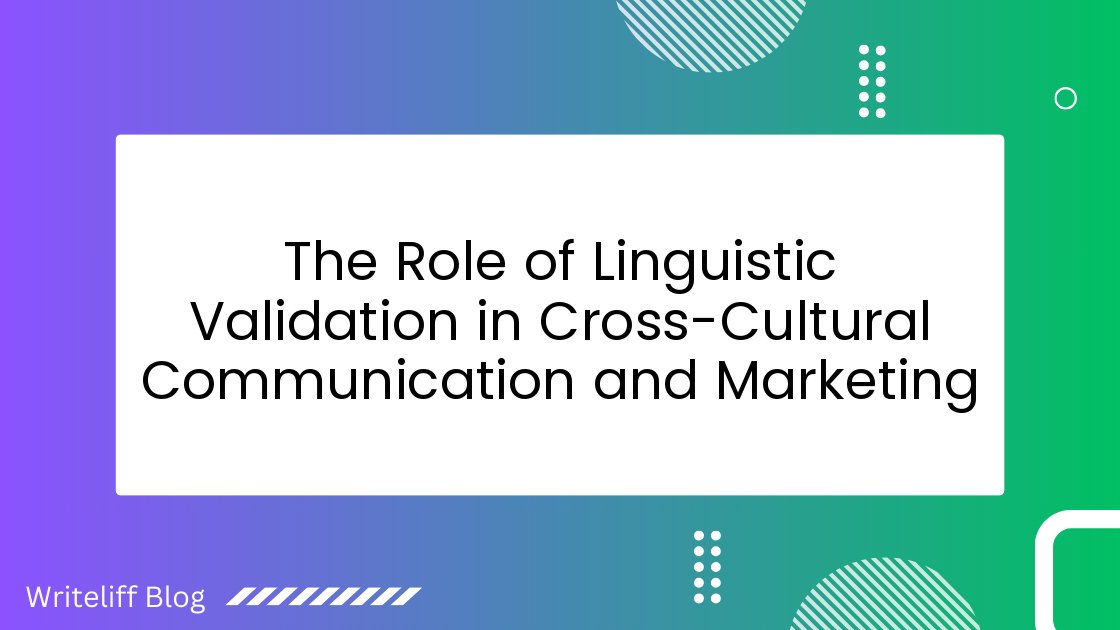The Role of Linguistic Validation in Cross-Cultural Communication and Marketing

In today’s globalized world, effective cross-cultural communication and marketing are essential for businesses looking to expand their reach and connect with diverse audiences. One crucial aspect of this process is linguistic validation, which ensures that translated content is accurate, culturally appropriate, and easy to understand. A professional translation service that offers linguistic validation can help businesses achieve this goal, ultimately leading to more successful cross-cultural communication and marketing efforts. In this blog post, we’ll explore the role of linguistic validation in cross-cultural communication and marketing, and discuss its importance for businesses looking to succeed in the global market.
What is Linguistic Validation?
Linguistic validation is a process that focuses on ensuring the accuracy, cultural appropriateness, and readability of translated content. It involves a thorough review of the translated material by native speakers who are experts in the subject matter. The main goals of linguistic validation include:
- Conceptual equivalence: Ensuring that the translated content conveys the same meaning as the original text.
- Cultural adaptation: Adapting the content to suit the cultural context of the target audience, including idiomatic expressions, humor, and references to local customs.
- Readability: Ensuring that the translated content is easy to read and understand for the target audience.
Why is Linguistic Validation Important for Cross-Cultural Communication and Marketing?
Linguistic validation plays a crucial role in cross-cultural communication and marketing for several reasons:
- Accuracy: Accurate translations are essential for conveying the intended message and avoiding misunderstandings that could harm your brand’s reputation or lead to lost business opportunities.
- Cultural appropriateness: Culturally appropriate content helps build trust and rapport with your target audience, making them more likely to engage with your brand and become loyal customers.
- Readability: Easy-to-read content ensures that your message is accessible to a wide range of people, increasing the likelihood of your marketing efforts resonating with your target audience.
How Linguistic Validation Supports Cross-Cultural Marketing Campaigns
When planning and executing cross-cultural marketing campaigns, linguistic validation can provide valuable support in several ways:
- Target audience analysis: Linguistic validation helps identify the specific needs and preferences of your target audience, ensuring that your marketing materials resonate with them on a deeper level.
- Brand consistency: By maintaining conceptual equivalence and cultural appropriateness across all translated content, linguistic validation helps ensure that your brand’s messaging remains consistent and recognizable, regardless of the language or market.
- Improved engagement: Accurate, culturally appropriate, and easy-to-read content is more likely to engage your target audience, leading to higher conversion rates and increased brand loyalty.
Choosing a Professional Translation Service for Linguistic Validation
When selecting a professional translation service for linguistic validation, consider the following factors to ensure the best results for your cross-cultural communication and marketing efforts:
- Industry expertise: Look for a translation service with experience in your industry, as they will be better equipped to handle the nuances and terminology specific to your field.
- Quality assurance processes: Ensure that the translation service offers linguistic validation as part of their quality assurance process, as this will help guarantee the accuracy, cultural appropriateness, and readability of your translated content.
- Native speakers: Work with a translation service that employs native speakers for linguistic validation, as they will have a better understanding of the cultural context and language nuances of the target audience.
Conclusion
Linguistic validation plays a vital role in cross-cultural communication and marketing, ensuring that your translated content is accurate, culturally appropriate, and easy to read for your target audience. By working with a professional translation service that offers linguistic validation, you can improve the effectiveness of your cross-cultural marketing campaigns, build trust with your target audience, and ultimately achieve greater success in the global market.
